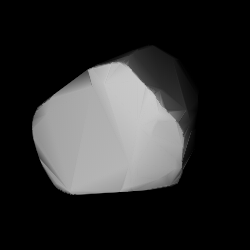Astronomy:5196 Bustelli
 Shape model of Roberts from its lightcurve | |
| Discovery [1] | |
|---|---|
| Discovered by | C. J. van Houten I. van Houten-G. T. Gehrels |
| Discovery site | Palomar Obs. |
| Discovery date | 30 September 1973 |
| Designations | |
| (5196) Bustelli | |
| Named after | Franz Anton Bustelli [1] (Italian-Swiss artist) |
| 3102 T-2 · 1982 SY9 1984 DP1 · 1984 FP1 | |
| Minor planet category | main-belt [1][2] · (middle) Eunomia [3] |
| Orbital characteristics [2] | |
| Epoch 23 March 2018 (JD 2458200.5) | |
| Uncertainty parameter 0 | |
| Observation arc | 46.60 yr (17,019 d) |
| |{{{apsis}}}|helion}} | 3.0788 AU |
| |{{{apsis}}}|helion}} | 2.3183 AU |
| 2.6985 AU | |
| Eccentricity | 0.1409 |
| Orbital period | 4.43 yr (1,619 d) |
| Mean anomaly | 268.18° |
| Mean motion | 0° 13m 20.28s / day |
| Inclination | 13.226° |
| Longitude of ascending node | 6.8289° |
| 113.42° | |
| Physical characteristics | |
| Mean diameter | 5.944±0.091 km[4] |
| Geometric albedo | 0.146±0.017[5] |
| SMASS = S [2][6] | |
| Absolute magnitude (H) | 12.8[2] |
5196 Bustelli (prov. designation: 3102 T-2) is a stony Eunomia asteroid from the central regions of the asteroid belt, approximately 6 kilometers (3.7 miles) kilometers in diameter. It was discovered on 30 September 1973, by Dutch astronomers Ingrid and Cornelis van Houten at Leiden, and Tom Gehrels the Palomar Observatory. The S-type asteroid was named after Italian-Swiss artist Franz Anton Bustelli.[1][2]
Orbit and classification
Bustelli is a core member of the Eunomia family (502),[3] a prominent family of stony S-type asteroid and the largest one in the intermediate main belt with more than 5,000 members.[7] It orbits the Sun in the central asteroid belt at a distance of 2.3–3.1 AU once every 4 years and 5 months (1,619 days; semi-major axis of 2.7 AU). Its orbit has an eccentricity of 0.14 and an inclination of 13° with respect to the ecliptic.[2] The body's observation arc begins with a precovery taken at Palomar Obsrvatory in March 1971.[1]
Palomar–Leiden Trojan survey
Naming
This minor planet was named after Italian-Swiss artist Franz Anton Bustelli (1723–1763), a famous modeller of figures for the Nymphenburg Porcelain Manufactory. The official naming citation was published by the Minor Planet Center on 1 September 1993 (M.P.C. 22507).[8]
Physical characteristics
Bustelli has an absolute magnitude of 12.8. In the SMASS classification, it is a stony S-type asteroid.[2][6]
Diameter and albedo
According to the survey carried out by the NEOWISE mission of NASA's Wide-field Infrared Survey Explorer, Bustelli measures 5.944 kilometers in diameter and its surface has an albedo of 0.146.[4][5]
Rotation period
As of 2018, no rotational lightcurve of Bustelli has been obtained from photometric observations. The body's rotation period, poles and shape remain unknown.[2]
References
- ↑ 1.0 1.1 1.2 1.3 1.4 "5196 Bustelli (3102 T-2)". Minor Planet Center. https://www.minorplanetcenter.net/db_search/show_object?object_id=5196.
- ↑ 2.0 2.1 2.2 2.3 2.4 2.5 2.6 2.7 "JPL Small-Body Database Browser: 5196 Bustelli (3102 T-2)". Jet Propulsion Laboratory. https://ssd.jpl.nasa.gov/sbdb.cgi?sstr=2005196.
- ↑ 3.0 3.1 "Asteroid 5196 Bustelli – Nesvorny HCM Asteroid Families V3.0". Small Bodies Data Ferret. https://sbntools.psi.edu/ferret/SimpleSearch/results.action?targetName=5196+Bustelli#Asteroid%205196%20BustelliEAR-A-VARGBDET-5-NESVORNYFAM-V3.0.
- ↑ 4.0 4.1 Masiero, Joseph R.; Mainzer, A. K.; Grav, T.; Bauer, J. M.; Cutri, R. M.; Dailey, J. et al. (November 2011). "Main Belt Asteroids with WISE/NEOWISE. I. Preliminary Albedos and Diameters". The Astrophysical Journal 741 (2): 20. doi:10.1088/0004-637X/741/2/68. Bibcode: 2011ApJ...741...68M.
- ↑ 5.0 5.1 Masiero, Joseph R.; Mainzer, A. K.; Grav, T.; Bauer, J. M.; Cutri, R. M.; Nugent, C. et al. (November 2012). "Preliminary Analysis of WISE/NEOWISE 3-Band Cryogenic and Post-cryogenic Observations of Main Belt Asteroids". The Astrophysical Journal Letters 759 (1): 5. doi:10.1088/2041-8205/759/1/L8. Bibcode: 2012ApJ...759L...8M.
- ↑ 6.0 6.1 Bus, S.; Binzel, R. P. (October 2004). "5196 Bustelli CCD Spectrum". NASA Planetary Data System. Bibcode: 2004PDSS....1.....B.
- ↑ Nesvorný, D.; Broz, M.; Carruba, V. (December 2014). "Identification and Dynamical Properties of Asteroid Families". Asteroids IV. pp. 297–321. doi:10.2458/azu_uapress_9780816532131-ch016. ISBN 9780816532131. Bibcode: 2015aste.book..297N.
- ↑ "MPC/MPO/MPS Archive". Minor Planet Center. https://www.minorplanetcenter.net/iau/ECS/MPCArchive/MPCArchive_TBL.html.
<ref> tag with name "MPC-Discoverers" defined in <references> is not used in prior text.External links
- Lightcurve Database Query (LCDB), at www.minorplanet.info
- Dictionary of Minor Planet Names, Google books
- Discovery Circumstances: Numbered Minor Planets (5001)-(10000) – Minor Planet Center
- 5196 Bustelli at AstDyS-2, Asteroids—Dynamic Site
- 5196 Bustelli at the JPL Small-Body Database
 |
